Business Communication Report: IQ, EQ, and Intercultural Elements
VerifiedAdded on 2020/01/07
|8
|2693
|162
Report
AI Summary
This report examines the critical role of communication in business, emphasizing the interplay of IQ and EQ in fostering effective workplace dynamics. It begins by highlighting the importance of communication in building relationships, boosting sales, and maintaining internal and external company structures. The report then delves into the perspectives of various authors, including Van Genderen and Daniel Goleman, to evaluate the significance of emotional intelligence (EQ) compared to intelligence quotient (IQ) in achieving success. The report explores how EQ impacts physical health, well-being, relationships, and conflict resolution. It further analyzes the characteristics of emotional intelligence, as defined by Goleman and others, and its impact on leadership, teamwork, and management skills. The report also discusses the importance of active listening, assertiveness, and the three elements of oral presentation (ethos, pathos, and logos) as tools for improving communication within a business context and also addresses intercultural elements of oral presentation. The conclusion summarizes the findings, emphasizing the vital role of effective communication in increasing employee morale, maximizing productivity, and resolving conflicts. The report utilizes various references to support its findings.
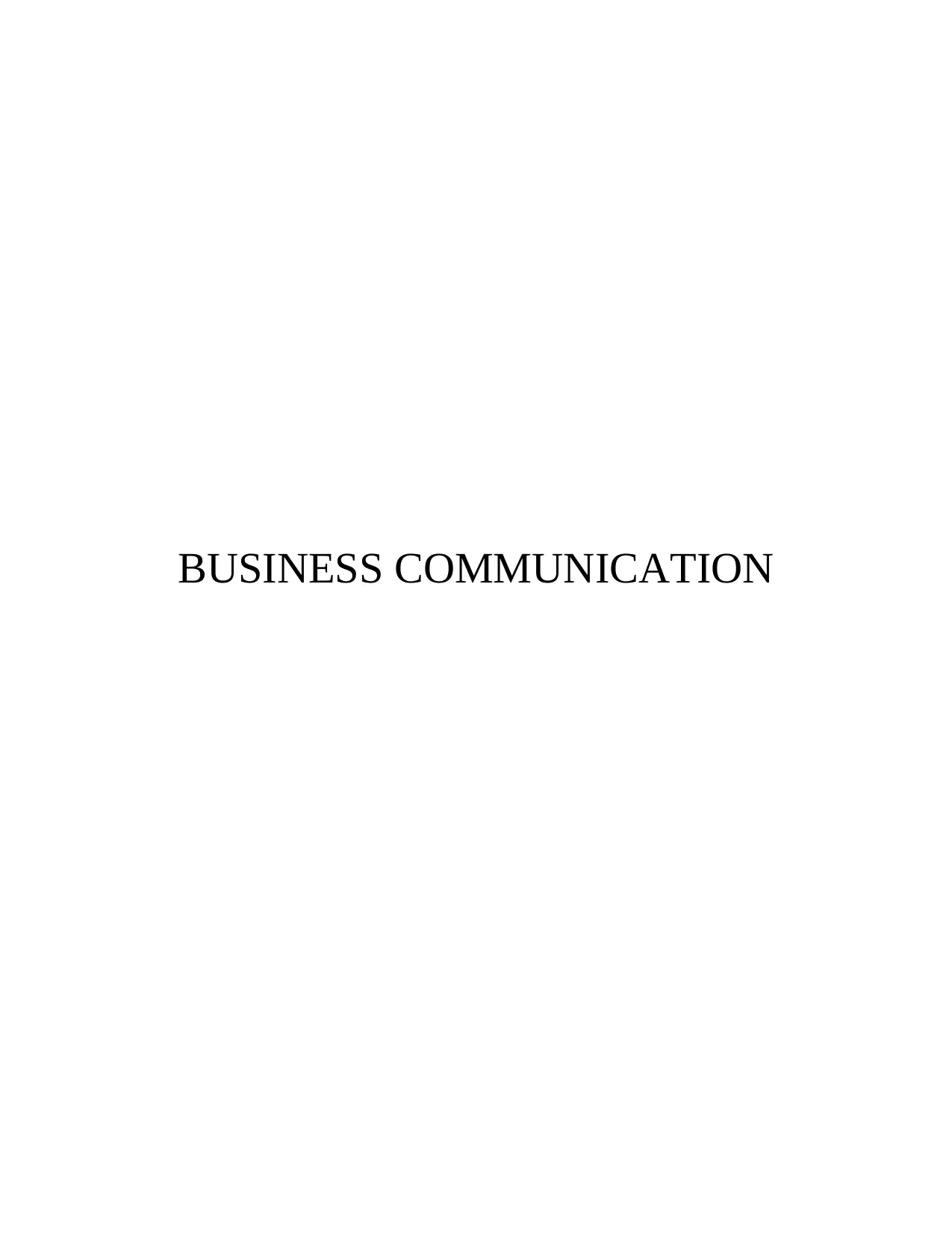
BUSINESS COMMUNICATION
Paraphrase This Document
Need a fresh take? Get an instant paraphrase of this document with our AI Paraphraser
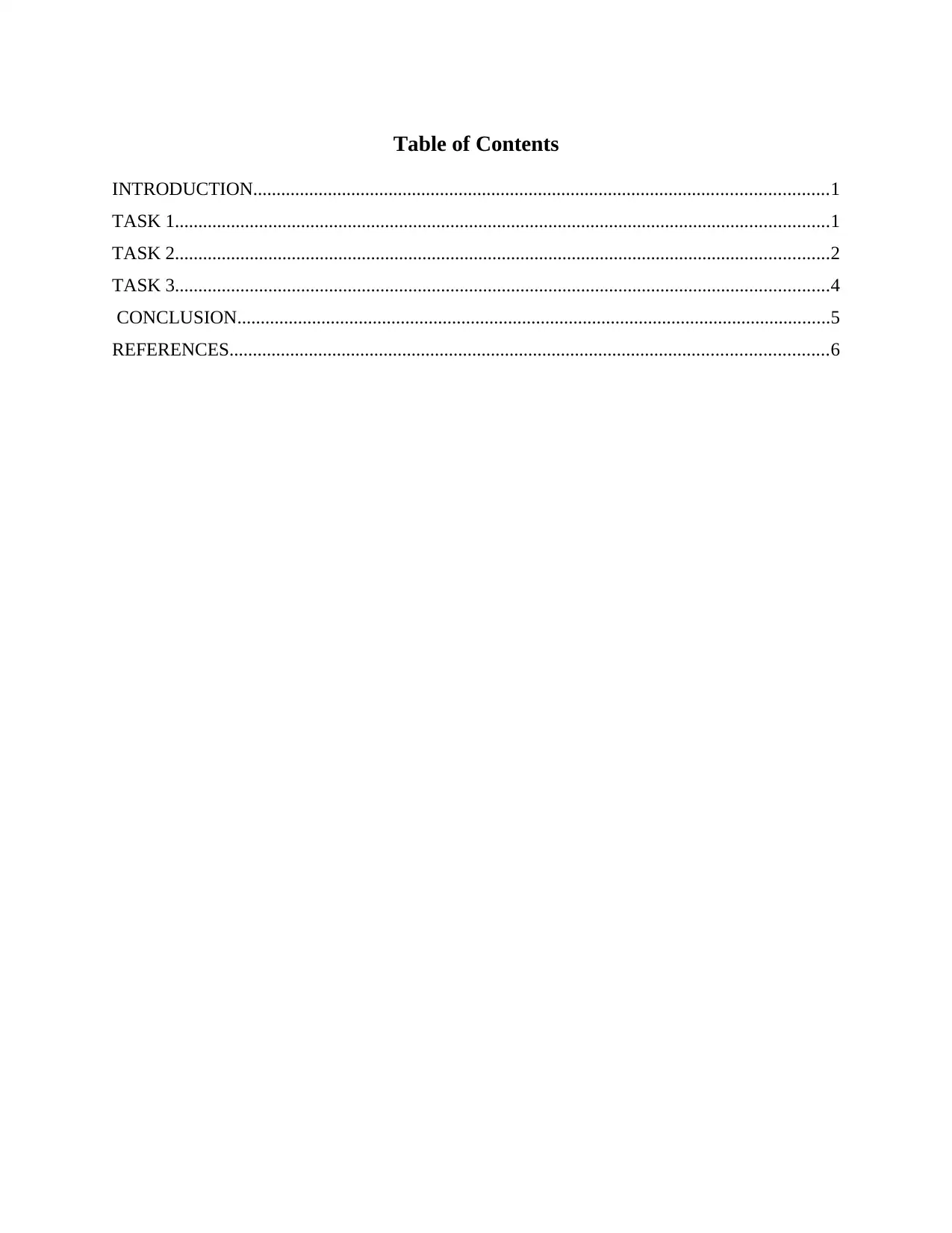
Table of Contents
INTRODUCTION...........................................................................................................................1
TASK 1............................................................................................................................................1
TASK 2............................................................................................................................................2
TASK 3............................................................................................................................................4
CONCLUSION...............................................................................................................................5
REFERENCES................................................................................................................................6
INTRODUCTION...........................................................................................................................1
TASK 1............................................................................................................................................1
TASK 2............................................................................................................................................2
TASK 3............................................................................................................................................4
CONCLUSION...............................................................................................................................5
REFERENCES................................................................................................................................6
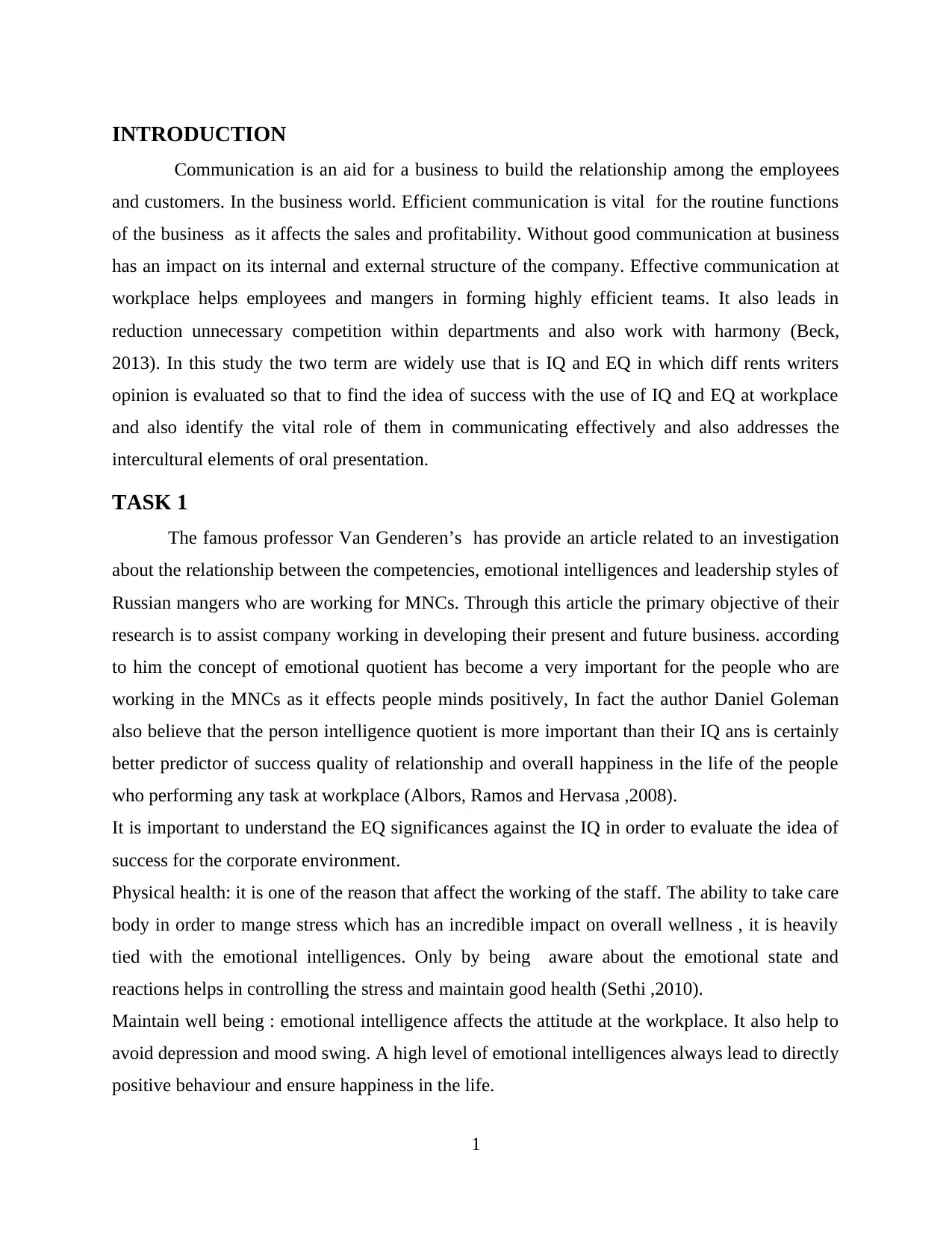
INTRODUCTION
Communication is an aid for a business to build the relationship among the employees
and customers. In the business world. Efficient communication is vital for the routine functions
of the business as it affects the sales and profitability. Without good communication at business
has an impact on its internal and external structure of the company. Effective communication at
workplace helps employees and mangers in forming highly efficient teams. It also leads in
reduction unnecessary competition within departments and also work with harmony (Beck,
2013). In this study the two term are widely use that is IQ and EQ in which diff rents writers
opinion is evaluated so that to find the idea of success with the use of IQ and EQ at workplace
and also identify the vital role of them in communicating effectively and also addresses the
intercultural elements of oral presentation.
TASK 1
The famous professor Van Genderen’s has provide an article related to an investigation
about the relationship between the competencies, emotional intelligences and leadership styles of
Russian mangers who are working for MNCs. Through this article the primary objective of their
research is to assist company working in developing their present and future business. according
to him the concept of emotional quotient has become a very important for the people who are
working in the MNCs as it effects people minds positively, In fact the author Daniel Goleman
also believe that the person intelligence quotient is more important than their IQ ans is certainly
better predictor of success quality of relationship and overall happiness in the life of the people
who performing any task at workplace (Albors, Ramos and Hervasa ,2008).
It is important to understand the EQ significances against the IQ in order to evaluate the idea of
success for the corporate environment.
Physical health: it is one of the reason that affect the working of the staff. The ability to take care
body in order to mange stress which has an incredible impact on overall wellness , it is heavily
tied with the emotional intelligences. Only by being aware about the emotional state and
reactions helps in controlling the stress and maintain good health (Sethi ,2010).
Maintain well being : emotional intelligence affects the attitude at the workplace. It also help to
avoid depression and mood swing. A high level of emotional intelligences always lead to directly
positive behaviour and ensure happiness in the life.
1
Communication is an aid for a business to build the relationship among the employees
and customers. In the business world. Efficient communication is vital for the routine functions
of the business as it affects the sales and profitability. Without good communication at business
has an impact on its internal and external structure of the company. Effective communication at
workplace helps employees and mangers in forming highly efficient teams. It also leads in
reduction unnecessary competition within departments and also work with harmony (Beck,
2013). In this study the two term are widely use that is IQ and EQ in which diff rents writers
opinion is evaluated so that to find the idea of success with the use of IQ and EQ at workplace
and also identify the vital role of them in communicating effectively and also addresses the
intercultural elements of oral presentation.
TASK 1
The famous professor Van Genderen’s has provide an article related to an investigation
about the relationship between the competencies, emotional intelligences and leadership styles of
Russian mangers who are working for MNCs. Through this article the primary objective of their
research is to assist company working in developing their present and future business. according
to him the concept of emotional quotient has become a very important for the people who are
working in the MNCs as it effects people minds positively, In fact the author Daniel Goleman
also believe that the person intelligence quotient is more important than their IQ ans is certainly
better predictor of success quality of relationship and overall happiness in the life of the people
who performing any task at workplace (Albors, Ramos and Hervasa ,2008).
It is important to understand the EQ significances against the IQ in order to evaluate the idea of
success for the corporate environment.
Physical health: it is one of the reason that affect the working of the staff. The ability to take care
body in order to mange stress which has an incredible impact on overall wellness , it is heavily
tied with the emotional intelligences. Only by being aware about the emotional state and
reactions helps in controlling the stress and maintain good health (Sethi ,2010).
Maintain well being : emotional intelligence affects the attitude at the workplace. It also help to
avoid depression and mood swing. A high level of emotional intelligences always lead to directly
positive behaviour and ensure happiness in the life.
1
⊘ This is a preview!⊘
Do you want full access?
Subscribe today to unlock all pages.

Trusted by 1+ million students worldwide
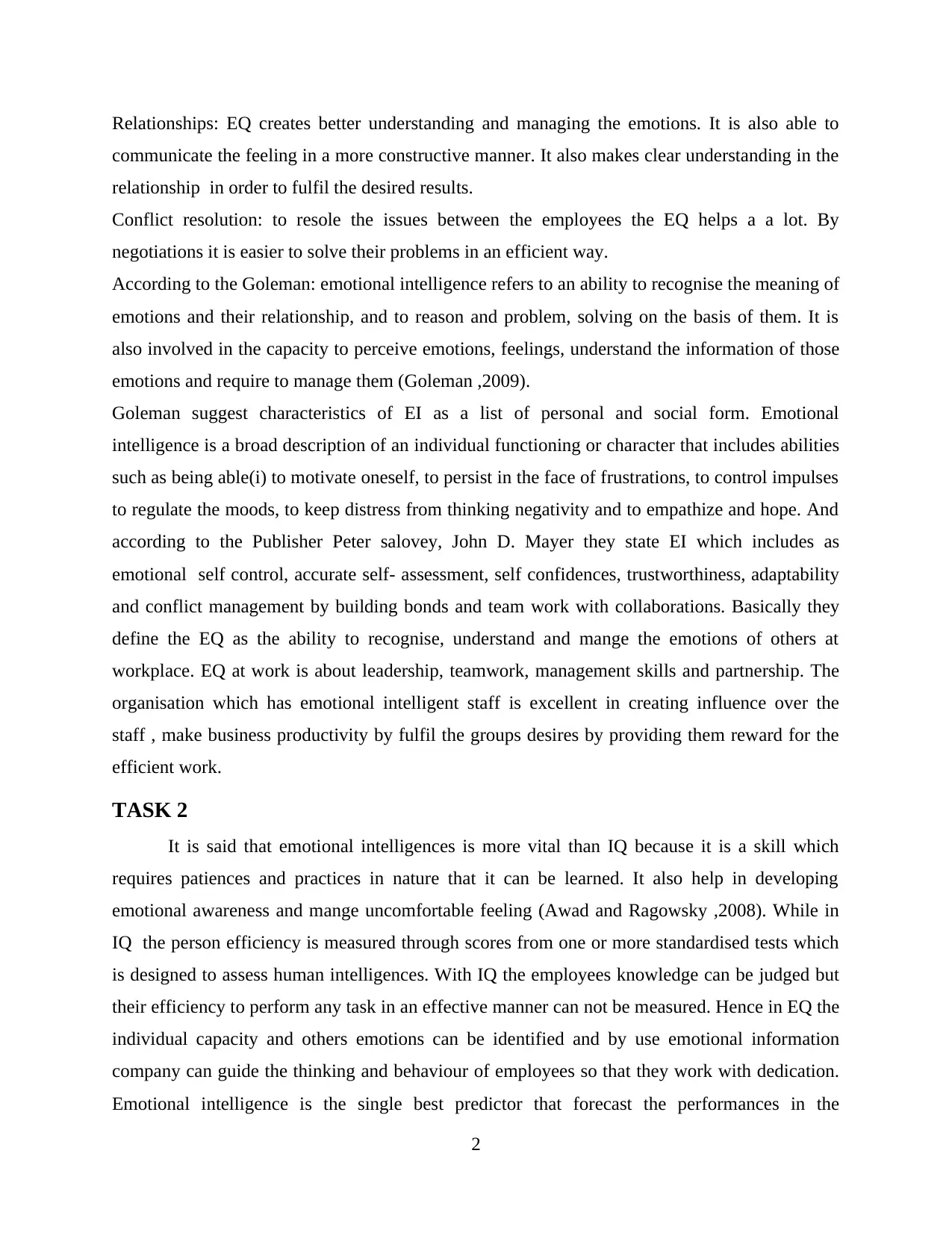
Relationships: EQ creates better understanding and managing the emotions. It is also able to
communicate the feeling in a more constructive manner. It also makes clear understanding in the
relationship in order to fulfil the desired results.
Conflict resolution: to resole the issues between the employees the EQ helps a a lot. By
negotiations it is easier to solve their problems in an efficient way.
According to the Goleman: emotional intelligence refers to an ability to recognise the meaning of
emotions and their relationship, and to reason and problem, solving on the basis of them. It is
also involved in the capacity to perceive emotions, feelings, understand the information of those
emotions and require to manage them (Goleman ,2009).
Goleman suggest characteristics of EI as a list of personal and social form. Emotional
intelligence is a broad description of an individual functioning or character that includes abilities
such as being able(i) to motivate oneself, to persist in the face of frustrations, to control impulses
to regulate the moods, to keep distress from thinking negativity and to empathize and hope. And
according to the Publisher Peter salovey, John D. Mayer they state EI which includes as
emotional self control, accurate self- assessment, self confidences, trustworthiness, adaptability
and conflict management by building bonds and team work with collaborations. Basically they
define the EQ as the ability to recognise, understand and mange the emotions of others at
workplace. EQ at work is about leadership, teamwork, management skills and partnership. The
organisation which has emotional intelligent staff is excellent in creating influence over the
staff , make business productivity by fulfil the groups desires by providing them reward for the
efficient work.
TASK 2
It is said that emotional intelligences is more vital than IQ because it is a skill which
requires patiences and practices in nature that it can be learned. It also help in developing
emotional awareness and mange uncomfortable feeling (Awad and Ragowsky ,2008). While in
IQ the person efficiency is measured through scores from one or more standardised tests which
is designed to assess human intelligences. With IQ the employees knowledge can be judged but
their efficiency to perform any task in an effective manner can not be measured. Hence in EQ the
individual capacity and others emotions can be identified and by use emotional information
company can guide the thinking and behaviour of employees so that they work with dedication.
Emotional intelligence is the single best predictor that forecast the performances in the
2
communicate the feeling in a more constructive manner. It also makes clear understanding in the
relationship in order to fulfil the desired results.
Conflict resolution: to resole the issues between the employees the EQ helps a a lot. By
negotiations it is easier to solve their problems in an efficient way.
According to the Goleman: emotional intelligence refers to an ability to recognise the meaning of
emotions and their relationship, and to reason and problem, solving on the basis of them. It is
also involved in the capacity to perceive emotions, feelings, understand the information of those
emotions and require to manage them (Goleman ,2009).
Goleman suggest characteristics of EI as a list of personal and social form. Emotional
intelligence is a broad description of an individual functioning or character that includes abilities
such as being able(i) to motivate oneself, to persist in the face of frustrations, to control impulses
to regulate the moods, to keep distress from thinking negativity and to empathize and hope. And
according to the Publisher Peter salovey, John D. Mayer they state EI which includes as
emotional self control, accurate self- assessment, self confidences, trustworthiness, adaptability
and conflict management by building bonds and team work with collaborations. Basically they
define the EQ as the ability to recognise, understand and mange the emotions of others at
workplace. EQ at work is about leadership, teamwork, management skills and partnership. The
organisation which has emotional intelligent staff is excellent in creating influence over the
staff , make business productivity by fulfil the groups desires by providing them reward for the
efficient work.
TASK 2
It is said that emotional intelligences is more vital than IQ because it is a skill which
requires patiences and practices in nature that it can be learned. It also help in developing
emotional awareness and mange uncomfortable feeling (Awad and Ragowsky ,2008). While in
IQ the person efficiency is measured through scores from one or more standardised tests which
is designed to assess human intelligences. With IQ the employees knowledge can be judged but
their efficiency to perform any task in an effective manner can not be measured. Hence in EQ the
individual capacity and others emotions can be identified and by use emotional information
company can guide the thinking and behaviour of employees so that they work with dedication.
Emotional intelligence is the single best predictor that forecast the performances in the
2
Paraphrase This Document
Need a fresh take? Get an instant paraphrase of this document with our AI Paraphraser
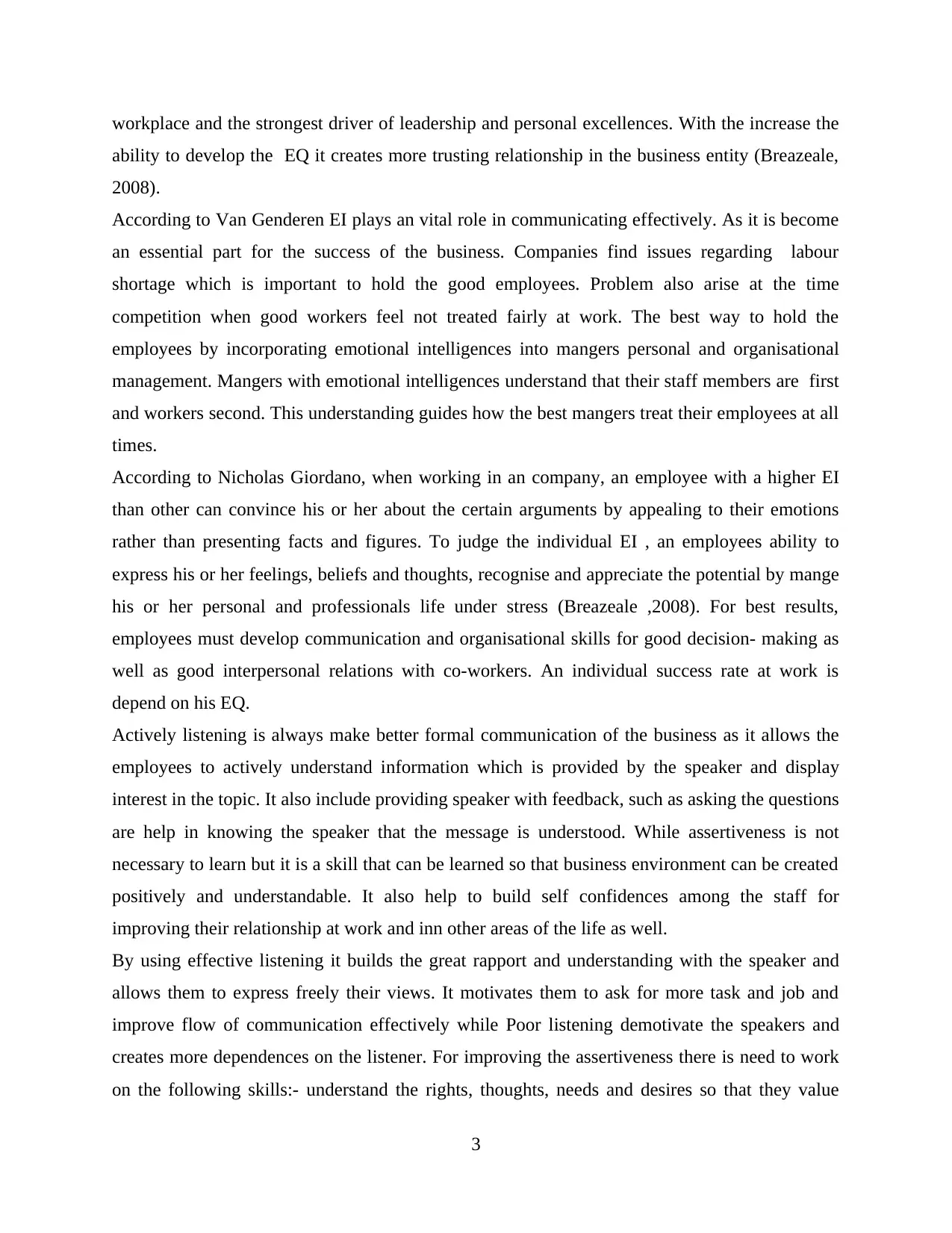
workplace and the strongest driver of leadership and personal excellences. With the increase the
ability to develop the EQ it creates more trusting relationship in the business entity (Breazeale,
2008).
According to Van Genderen EI plays an vital role in communicating effectively. As it is become
an essential part for the success of the business. Companies find issues regarding labour
shortage which is important to hold the good employees. Problem also arise at the time
competition when good workers feel not treated fairly at work. The best way to hold the
employees by incorporating emotional intelligences into mangers personal and organisational
management. Mangers with emotional intelligences understand that their staff members are first
and workers second. This understanding guides how the best mangers treat their employees at all
times.
According to Nicholas Giordano, when working in an company, an employee with a higher EI
than other can convince his or her about the certain arguments by appealing to their emotions
rather than presenting facts and figures. To judge the individual EI , an employees ability to
express his or her feelings, beliefs and thoughts, recognise and appreciate the potential by mange
his or her personal and professionals life under stress (Breazeale ,2008). For best results,
employees must develop communication and organisational skills for good decision- making as
well as good interpersonal relations with co-workers. An individual success rate at work is
depend on his EQ.
Actively listening is always make better formal communication of the business as it allows the
employees to actively understand information which is provided by the speaker and display
interest in the topic. It also include providing speaker with feedback, such as asking the questions
are help in knowing the speaker that the message is understood. While assertiveness is not
necessary to learn but it is a skill that can be learned so that business environment can be created
positively and understandable. It also help to build self confidences among the staff for
improving their relationship at work and inn other areas of the life as well.
By using effective listening it builds the great rapport and understanding with the speaker and
allows them to express freely their views. It motivates them to ask for more task and job and
improve flow of communication effectively while Poor listening demotivate the speakers and
creates more dependences on the listener. For improving the assertiveness there is need to work
on the following skills:- understand the rights, thoughts, needs and desires so that they value
3
ability to develop the EQ it creates more trusting relationship in the business entity (Breazeale,
2008).
According to Van Genderen EI plays an vital role in communicating effectively. As it is become
an essential part for the success of the business. Companies find issues regarding labour
shortage which is important to hold the good employees. Problem also arise at the time
competition when good workers feel not treated fairly at work. The best way to hold the
employees by incorporating emotional intelligences into mangers personal and organisational
management. Mangers with emotional intelligences understand that their staff members are first
and workers second. This understanding guides how the best mangers treat their employees at all
times.
According to Nicholas Giordano, when working in an company, an employee with a higher EI
than other can convince his or her about the certain arguments by appealing to their emotions
rather than presenting facts and figures. To judge the individual EI , an employees ability to
express his or her feelings, beliefs and thoughts, recognise and appreciate the potential by mange
his or her personal and professionals life under stress (Breazeale ,2008). For best results,
employees must develop communication and organisational skills for good decision- making as
well as good interpersonal relations with co-workers. An individual success rate at work is
depend on his EQ.
Actively listening is always make better formal communication of the business as it allows the
employees to actively understand information which is provided by the speaker and display
interest in the topic. It also include providing speaker with feedback, such as asking the questions
are help in knowing the speaker that the message is understood. While assertiveness is not
necessary to learn but it is a skill that can be learned so that business environment can be created
positively and understandable. It also help to build self confidences among the staff for
improving their relationship at work and inn other areas of the life as well.
By using effective listening it builds the great rapport and understanding with the speaker and
allows them to express freely their views. It motivates them to ask for more task and job and
improve flow of communication effectively while Poor listening demotivate the speakers and
creates more dependences on the listener. For improving the assertiveness there is need to work
on the following skills:- understand the rights, thoughts, needs and desires so that they value
3
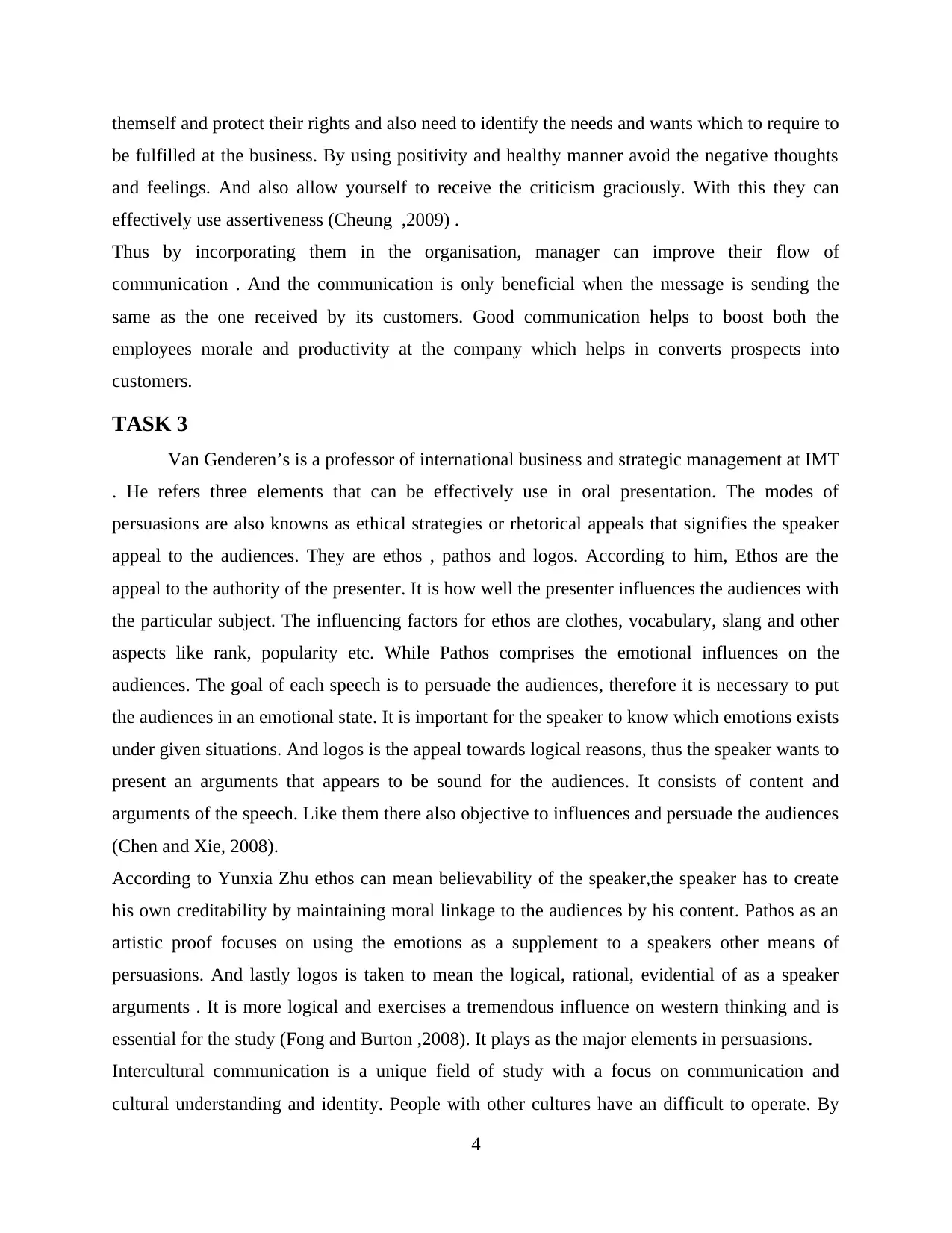
themself and protect their rights and also need to identify the needs and wants which to require to
be fulfilled at the business. By using positivity and healthy manner avoid the negative thoughts
and feelings. And also allow yourself to receive the criticism graciously. With this they can
effectively use assertiveness (Cheung ,2009) .
Thus by incorporating them in the organisation, manager can improve their flow of
communication . And the communication is only beneficial when the message is sending the
same as the one received by its customers. Good communication helps to boost both the
employees morale and productivity at the company which helps in converts prospects into
customers.
TASK 3
Van Genderen’s is a professor of international business and strategic management at IMT
. He refers three elements that can be effectively use in oral presentation. The modes of
persuasions are also knowns as ethical strategies or rhetorical appeals that signifies the speaker
appeal to the audiences. They are ethos , pathos and logos. According to him, Ethos are the
appeal to the authority of the presenter. It is how well the presenter influences the audiences with
the particular subject. The influencing factors for ethos are clothes, vocabulary, slang and other
aspects like rank, popularity etc. While Pathos comprises the emotional influences on the
audiences. The goal of each speech is to persuade the audiences, therefore it is necessary to put
the audiences in an emotional state. It is important for the speaker to know which emotions exists
under given situations. And logos is the appeal towards logical reasons, thus the speaker wants to
present an arguments that appears to be sound for the audiences. It consists of content and
arguments of the speech. Like them there also objective to influences and persuade the audiences
(Chen and Xie, 2008).
According to Yunxia Zhu ethos can mean believability of the speaker,the speaker has to create
his own creditability by maintaining moral linkage to the audiences by his content. Pathos as an
artistic proof focuses on using the emotions as a supplement to a speakers other means of
persuasions. And lastly logos is taken to mean the logical, rational, evidential of as a speaker
arguments . It is more logical and exercises a tremendous influence on western thinking and is
essential for the study (Fong and Burton ,2008). It plays as the major elements in persuasions.
Intercultural communication is a unique field of study with a focus on communication and
cultural understanding and identity. People with other cultures have an difficult to operate. By
4
be fulfilled at the business. By using positivity and healthy manner avoid the negative thoughts
and feelings. And also allow yourself to receive the criticism graciously. With this they can
effectively use assertiveness (Cheung ,2009) .
Thus by incorporating them in the organisation, manager can improve their flow of
communication . And the communication is only beneficial when the message is sending the
same as the one received by its customers. Good communication helps to boost both the
employees morale and productivity at the company which helps in converts prospects into
customers.
TASK 3
Van Genderen’s is a professor of international business and strategic management at IMT
. He refers three elements that can be effectively use in oral presentation. The modes of
persuasions are also knowns as ethical strategies or rhetorical appeals that signifies the speaker
appeal to the audiences. They are ethos , pathos and logos. According to him, Ethos are the
appeal to the authority of the presenter. It is how well the presenter influences the audiences with
the particular subject. The influencing factors for ethos are clothes, vocabulary, slang and other
aspects like rank, popularity etc. While Pathos comprises the emotional influences on the
audiences. The goal of each speech is to persuade the audiences, therefore it is necessary to put
the audiences in an emotional state. It is important for the speaker to know which emotions exists
under given situations. And logos is the appeal towards logical reasons, thus the speaker wants to
present an arguments that appears to be sound for the audiences. It consists of content and
arguments of the speech. Like them there also objective to influences and persuade the audiences
(Chen and Xie, 2008).
According to Yunxia Zhu ethos can mean believability of the speaker,the speaker has to create
his own creditability by maintaining moral linkage to the audiences by his content. Pathos as an
artistic proof focuses on using the emotions as a supplement to a speakers other means of
persuasions. And lastly logos is taken to mean the logical, rational, evidential of as a speaker
arguments . It is more logical and exercises a tremendous influence on western thinking and is
essential for the study (Fong and Burton ,2008). It plays as the major elements in persuasions.
Intercultural communication is a unique field of study with a focus on communication and
cultural understanding and identity. People with other cultures have an difficult to operate. By
4
⊘ This is a preview!⊘
Do you want full access?
Subscribe today to unlock all pages.

Trusted by 1+ million students worldwide

interacting with them in a positive manner that help in learning about others countries and
customs. A culture is a complete pattern of living. Three cultural elements have the potential to
affect the situations in which people from different backgrounds come together which are
perception, verbal processes and non-verbal processes. In Intercultural communication the
chances of really understanding each other is quite low. Intercultural includes that two parties
from different cultural backgrounds are involved. The message is interpreted is based on the
culture and this is the major difficulty in intercultural presentations. The two cultures never look
alike. Thus the greater differences between the two cultures involved, the most difficult it is for
the parties to understand each other. Co- cultural theory can be use for the co-cultural
communication which refers to interactions among under represented and dominant group
members (Beck, 2013). Co-cultures include but are not limited to people of colour, women,
person with disabilities and lower caste classes. Therefore this theory looks at the strategic ways
in which co-cultural group members communicate with others.
CONCLUSION
From the above report it is concluded that effective communication at the workplace
plays an vital role in increasing employees morale and maximise the productivity. With the
proper flow communication it is notices that it saves time, it facilitates coordination of the task,
provides emotional and social assistances to the organisational members and help in resolving
the conflicts. In the first task the relevance of emotional intelligences are evaluated based on Van
Genderen and also define the features of EQ with the references of Goleman. Further in task
second the EQ role in communication is studied and also explained active listening and
assertiveness to improve the flow of communication. lastly in task third the Van Genderen three
elements are studied and also identify the intercultural elements in order to implement effective
communications.
5
customs. A culture is a complete pattern of living. Three cultural elements have the potential to
affect the situations in which people from different backgrounds come together which are
perception, verbal processes and non-verbal processes. In Intercultural communication the
chances of really understanding each other is quite low. Intercultural includes that two parties
from different cultural backgrounds are involved. The message is interpreted is based on the
culture and this is the major difficulty in intercultural presentations. The two cultures never look
alike. Thus the greater differences between the two cultures involved, the most difficult it is for
the parties to understand each other. Co- cultural theory can be use for the co-cultural
communication which refers to interactions among under represented and dominant group
members (Beck, 2013). Co-cultures include but are not limited to people of colour, women,
person with disabilities and lower caste classes. Therefore this theory looks at the strategic ways
in which co-cultural group members communicate with others.
CONCLUSION
From the above report it is concluded that effective communication at the workplace
plays an vital role in increasing employees morale and maximise the productivity. With the
proper flow communication it is notices that it saves time, it facilitates coordination of the task,
provides emotional and social assistances to the organisational members and help in resolving
the conflicts. In the first task the relevance of emotional intelligences are evaluated based on Van
Genderen and also define the features of EQ with the references of Goleman. Further in task
second the EQ role in communication is studied and also explained active listening and
assertiveness to improve the flow of communication. lastly in task third the Van Genderen three
elements are studied and also identify the intercultural elements in order to implement effective
communications.
5
Paraphrase This Document
Need a fresh take? Get an instant paraphrase of this document with our AI Paraphraser
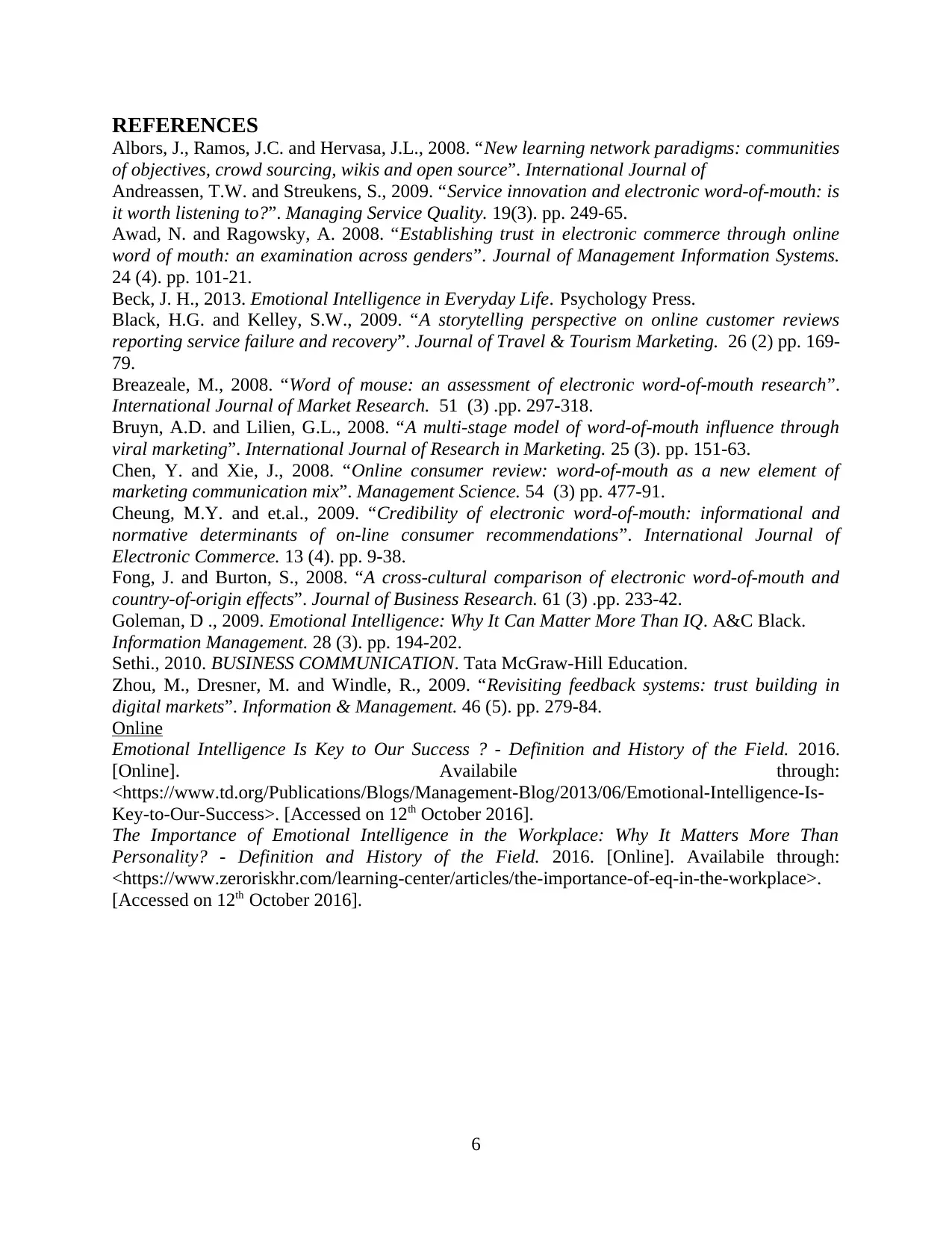
REFERENCES
Albors, J., Ramos, J.C. and Hervasa, J.L., 2008. “New learning network paradigms: communities
of objectives, crowd sourcing, wikis and open source”. International Journal of
Andreassen, T.W. and Streukens, S., 2009. “Service innovation and electronic word‐of‐mouth: is
it worth listening to?”. Managing Service Quality. 19(3). pp. 249‐65.
Awad, N. and Ragowsky, A. 2008. “Establishing trust in electronic commerce through online
word of mouth: an examination across genders”. Journal of Management Information Systems.
24 (4). pp. 101‐21.
Beck, J. H., 2013. Emotional Intelligence in Everyday Life. Psychology Press.
Black, H.G. and Kelley, S.W., 2009. “A storytelling perspective on online customer reviews
reporting service failure and recovery”. Journal of Travel & Tourism Marketing. 26 (2) pp. 169‐
79.
Breazeale, M., 2008. “Word of mouse: an assessment of electronic word‐of‐mouth research”.
International Journal of Market Research. 51 (3) .pp. 297‐318.
Bruyn, A.D. and Lilien, G.L., 2008. “A multi‐stage model of word‐of‐mouth influence through
viral marketing”. International Journal of Research in Marketing. 25 (3). pp. 151‐63.
Chen, Y. and Xie, J., 2008. “Online consumer review: word‐of‐mouth as a new element of
marketing communication mix”. Management Science. 54 (3) pp. 477‐91.
Cheung, M.Y. and et.al., 2009. “Credibility of electronic word‐of‐mouth: informational and
normative determinants of on‐line consumer recommendations”. International Journal of
Electronic Commerce. 13 (4). pp. 9‐38.
Fong, J. and Burton, S., 2008. “A cross‐cultural comparison of electronic word‐of‐mouth and
country‐of‐origin effects”. Journal of Business Research. 61 (3) .pp. 233‐42.
Goleman, D ., 2009. Emotional Intelligence: Why It Can Matter More Than IQ. A&C Black.
Information Management. 28 (3). pp. 194‐202.
Sethi., 2010. BUSINESS COMMUNICATION. Tata McGraw-Hill Education.
Zhou, M., Dresner, M. and Windle, R., 2009. “Revisiting feedback systems: trust building in
digital markets”. Information & Management. 46 (5). pp. 279‐84.
Online
Emotional Intelligence Is Key to Our Success ? - Definition and History of the Field. 2016.
[Online]. Availabile through:
<https://www.td.org/Publications/Blogs/Management-Blog/2013/06/Emotional-Intelligence-Is-
Key-to-Our-Success>. [Accessed on 12th October 2016].
The Importance of Emotional Intelligence in the Workplace: Why It Matters More Than
Personality? - Definition and History of the Field. 2016. [Online]. Availabile through:
<https://www.zeroriskhr.com/learning-center/articles/the-importance-of-eq-in-the-workplace>.
[Accessed on 12th October 2016].
6
Albors, J., Ramos, J.C. and Hervasa, J.L., 2008. “New learning network paradigms: communities
of objectives, crowd sourcing, wikis and open source”. International Journal of
Andreassen, T.W. and Streukens, S., 2009. “Service innovation and electronic word‐of‐mouth: is
it worth listening to?”. Managing Service Quality. 19(3). pp. 249‐65.
Awad, N. and Ragowsky, A. 2008. “Establishing trust in electronic commerce through online
word of mouth: an examination across genders”. Journal of Management Information Systems.
24 (4). pp. 101‐21.
Beck, J. H., 2013. Emotional Intelligence in Everyday Life. Psychology Press.
Black, H.G. and Kelley, S.W., 2009. “A storytelling perspective on online customer reviews
reporting service failure and recovery”. Journal of Travel & Tourism Marketing. 26 (2) pp. 169‐
79.
Breazeale, M., 2008. “Word of mouse: an assessment of electronic word‐of‐mouth research”.
International Journal of Market Research. 51 (3) .pp. 297‐318.
Bruyn, A.D. and Lilien, G.L., 2008. “A multi‐stage model of word‐of‐mouth influence through
viral marketing”. International Journal of Research in Marketing. 25 (3). pp. 151‐63.
Chen, Y. and Xie, J., 2008. “Online consumer review: word‐of‐mouth as a new element of
marketing communication mix”. Management Science. 54 (3) pp. 477‐91.
Cheung, M.Y. and et.al., 2009. “Credibility of electronic word‐of‐mouth: informational and
normative determinants of on‐line consumer recommendations”. International Journal of
Electronic Commerce. 13 (4). pp. 9‐38.
Fong, J. and Burton, S., 2008. “A cross‐cultural comparison of electronic word‐of‐mouth and
country‐of‐origin effects”. Journal of Business Research. 61 (3) .pp. 233‐42.
Goleman, D ., 2009. Emotional Intelligence: Why It Can Matter More Than IQ. A&C Black.
Information Management. 28 (3). pp. 194‐202.
Sethi., 2010. BUSINESS COMMUNICATION. Tata McGraw-Hill Education.
Zhou, M., Dresner, M. and Windle, R., 2009. “Revisiting feedback systems: trust building in
digital markets”. Information & Management. 46 (5). pp. 279‐84.
Online
Emotional Intelligence Is Key to Our Success ? - Definition and History of the Field. 2016.
[Online]. Availabile through:
<https://www.td.org/Publications/Blogs/Management-Blog/2013/06/Emotional-Intelligence-Is-
Key-to-Our-Success>. [Accessed on 12th October 2016].
The Importance of Emotional Intelligence in the Workplace: Why It Matters More Than
Personality? - Definition and History of the Field. 2016. [Online]. Availabile through:
<https://www.zeroriskhr.com/learning-center/articles/the-importance-of-eq-in-the-workplace>.
[Accessed on 12th October 2016].
6
1 out of 8
Related Documents
Your All-in-One AI-Powered Toolkit for Academic Success.
+13062052269
info@desklib.com
Available 24*7 on WhatsApp / Email
![[object Object]](/_next/static/media/star-bottom.7253800d.svg)
Unlock your academic potential
Copyright © 2020–2026 A2Z Services. All Rights Reserved. Developed and managed by ZUCOL.




